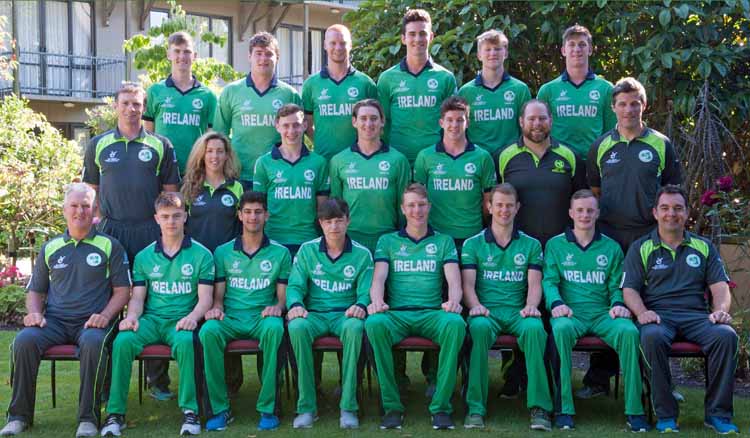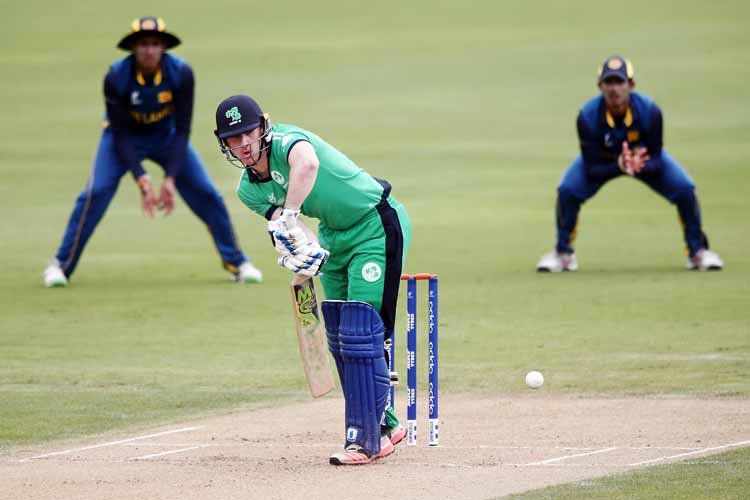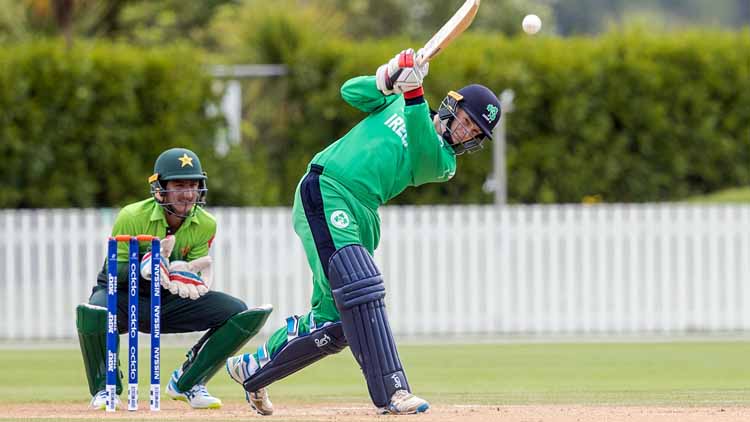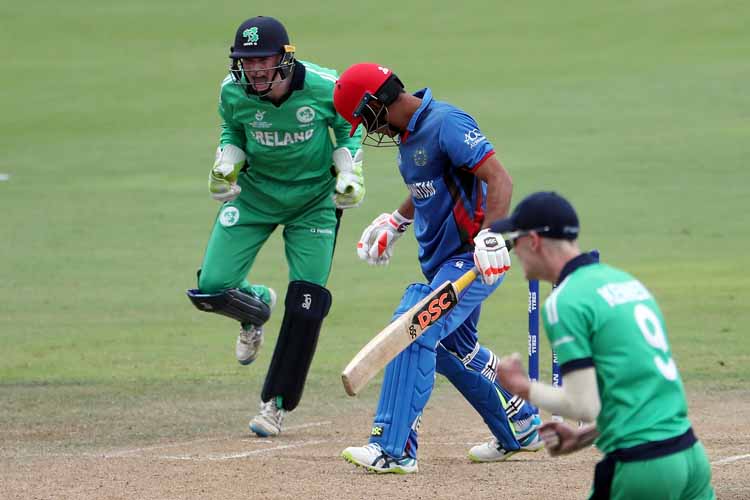The 2018 edition was held throughout New Zealand from January 13th until February 3rd with as usual sixteen participants split across four groups.
The Irish were there along with Afghanistan, now as Full Members, but the Irish had to battle it out to book their ticket, beating Scotland in a real nail-biter in Jersey.
Ireland were led by Harry Tector, with their left-arm pacer Josh Little the only player in their ranks with senior international experience. They were placed in Group D alongside Sri Lanka, Pakistan and Afghanistan.
 The Ireland squad in New Zealand
The Ireland squad in New Zealand
Their first match against Sri Lanka saw an opening stand of 72 with runs from Jamie Grassi (75) and Mark Donegan (36) as they posted 208/7, which looked challenging. When Aaron Cawley struck two early blows an upset seemed possible, but an unbroken fourth wicket stand of 157 between Lakshan 101* and Mendis 74* saw Sri Lanka prevail.
 Jamie Grassi batting during his 75 for Ireland against Sri Lanka (© ICC)
Jamie Grassi batting during his 75 for Ireland against Sri Lanka (© ICC)
In the other opening game of the group, Afghanistan stunned Pakistan by five wickets, and they took their humiliation out on Ireland who they faced next.
Shaheen Shah Afridi unleased a bouncer barrage on the shell-shocked Irish batters, going on to take 6 for 15 as Ireland made just 97 – Josh Little top scoring with an unbeaten 24. In a brutally one-sided contest Pakistan took less than nine overs to pass their target – a real dark day for youth cricket in the region.
 Ireland's Mark Donegan batting against Pakistan (© ICC)
Ireland's Mark Donegan batting against Pakistan (© ICC)
Afghanistan ensured their progress with a 32-run win against Sri Lanka, who would lose their crunch match against Pakistan thus condemning themselves to the Plate competition.
The Irish licked their wounds and prepared to face the Afghans in the final group match in front of a noisy crowd in Whangarei. The Irish batters showed great character as six made 20 or more in posting 225 for 8. Graham Kennedy top-scored with 37, while also chipping in were Harry Tector (36), Neil Rock (35), Jamie Grassi (32), Josh Little (27) and Morgan Topping (23).
The game was to be one of the most exciting in the event, and the Irish held their nerve as they had done in the qualifiers to seal a morale boosting four-run win. The Irish pulled off some stunning catches, while the bowling honours went to Tector (3-37) and Little (2-40).
 Ireland celebrate the fall of a wicket against Afghanistan (© ICC)
Ireland celebrate the fall of a wicket against Afghanistan (© ICC)
England won Group C with their captain Harry Brook of Yorkshire making a century against Bangladesh, who also progressed, while Liam Banks and Will Jacks also scored hundreds as Canada were put to the sword. A Khan (72), A Gill (52), and K Singh (50) ensured the Canadians won the Associate bragging rights as they beat Namibia by four wickets.
Group B was won by tournament favourites India, with Australia runners-up. The pair inflicted some serious maulings on Papua New Guinea, while Zimbabwe was also beaten badly. PNG lost by ten wickets to both India and Zimbabwe, while losing by a whopping 359 runs to Australia for whom Nathan McSweeney hit 156, and skipper Jason Sangha (88).
New Zealand won all three matches to top Group A, where they were joined by South Africa who pipped defending champions West Indies. Associate side Kenya were on the wrong end of three drubbings losing by 243, 222, and 169 runs.
In the main competition quarter-finals Australian leg-spinner Lloyd Pope recorded the best figures in U19 World Cup history claiming 8 for 35 as England were beaten by 31 runs. The following year Pope would take seven wickets for South Australia against Queensland in a Sheffield Shield game – the youngest to do so.
Afghanistan stunned New Zealand with a thumping 202 run win – four wickets for Mujeeb who emerged in this tournament. Pakistan edged out South Africa by three wickets chasing 190, while India dominated Bangladesh to win by 131 runs. The semi-finals were one-sided games with Australia beating Afghanistan by six wickets while India’s batters and bowlers trounced Pakistan by 203 runs.
In the final Australia would have fancied their chances after making 216, but it proved woefully inadequate as Manjot Kalra’s undefeated 101 led them to a convincing eight-wicket win.
Back to the Plate Competition and Ireland looked well placed in their clash with the West Indies at the halfway point after making 278/8 – Neil Rock (91) and Harry Tector (69) adding 116 for the fifth wicket. However, a litany of missed chances let champions West Indies off the hook as they won by four wickets in the penultimate over.
West Indies would go on to contest the Plate decider with Sri Lanka, being beaten by three wickets with Boyagoda’s 116 securing victory with two balls remaining.
The Irish would finish on a high note as they notched back-to-back wins against PNG and Namibia. JJ Garth took four wickets and Harry Tector three as PNG made 122. Ireland’s reply stuttered before Neil Rock’s 43 all but got them over the line in a three-wicket win.
It was a much different story in their match against Namibia with Harry Tector hitting 101 – Ireland’s first World Cup hundred since Paul Stirling in 2010. Backed up by fifties for Neil Rock and Jamie Grassi, Ireland made 288 for 6. That was 102 too many for Namibia with Little claiming three scalps and Garth two.
So a 13th place finish for the Boys In Green, which seems par for the course for them. This is what I thought and wrote at the time.
“On the face of it, 13th place looks very disappointing, especially as it means the next group will be forced to go through the Russian Roulette of a qualifying tournament alongside Celtic rivals Scotland in 2019.
That of course doesn't tell the whole story of a squad which dug deep to pull off incredible come-back wins over Scotland (twice) to get to New Zealand, and once there performed admirably, one aberration apart.
There's no doubting that the team went into the competition seriously hamstrung by the lack of match practice. Three of their four scheduled warm-up games fell foul of the weather meaning they began the competition having played just one match outdoors since the end of July.
Contrast their preparation with that of their peers who all played at least one series ahead of the tournament. Ireland may now be a Full Member but there's no doubt their build-up was seriously amateurish”
Lessons to be learned for future competitions perhaps?

